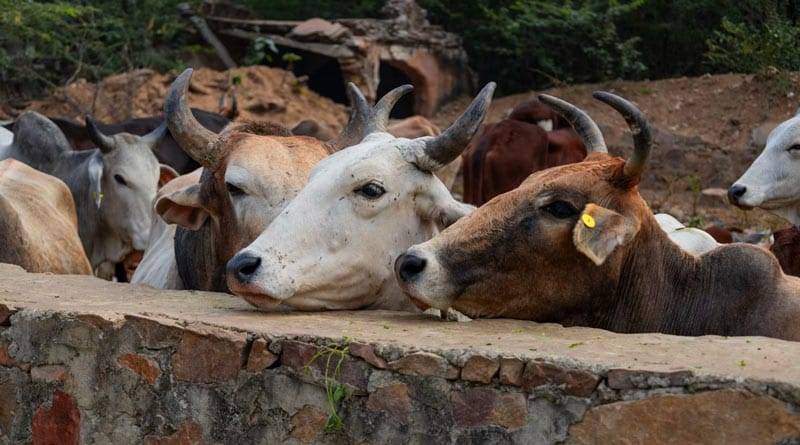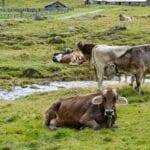Main Points In Hindi (मुख्य बातें – हिंदी में)
यहाँ पर दिए गए पाठ का मुख्य बिंदुओं का संक्षेप में हिंदी में वर्णन किया गया है:
-
पोषण और प्रतिरक्षा का संबंध: पशुओं की प्रतिरक्षा मुख्य रूप से उन पोषक तत्वों पर निर्भर करती है जो उन्हें आवश्यक होते हैं। संतुलित आहार जैसे कि विटामिन, प्रोटीन, खनिज और ऊर्जाएं प्रतिरक्षा प्रतिक्रिया, एंटीबॉडी उत्पादन और ऊतकों की मरम्मत के लिए जरूरी हैं।
-
न्यूट्रिशनल कमी का प्रभाव: पाठ में उल्लेखित है कि जब पशुओं का पोषण उचित नहीं होता, तो उनकी प्रतिरक्षा कमजोर होती है। इससे संक्रमण, जैसे फूट-एंड-माउथ डिजीज (FMD) के लिए उनकी संवेदनशीलता बढ़ जाती है।
-
उपचार में देरी: कमजोर पोषण वाले पशुओं को FMD से संक्रमित होने पर अधिक समय तक उबरने में कठिनाई होती है। सही पोषण तेजी से ठीक होने और सामान्य शारीरिक कार्यों की पुनर्प्राप्ति में महत्वपूर्ण है।
-
टीकाकरण की प्रभावशीलता में कमी: अगर पशु पोषण की कमी का सामना कर रहे हैं, तो टीकाकरण का असर कम हो सकता है। अच्छी तरह से पोषित पशु टीके पर बेहतर प्रतिक्रिया देते हैं, जबकि कुपोषित पशुओं को टीकों से अपेक्षित सुरक्षा नहीं मिलती।
- FMD के जोखिम को कम करने के लिए पोषण रणनीतियाँ: FMD के जोखिम को कम करने के लिए, संतुलित आहार, आहार पूरक, तनाव प्रबंधन और पोषण स्तर की निगरानी करने की सिफारिश की गई है। सही पोषण से पशुओं की प्रतिरक्षा में सुधार होता है और बीमारी की संभावनाओं को कम किया जा सकता है।
ये बिंदु पशुओं के पोषण और स्वास्थ्य पर प्रभाव डालने वाले प्रमुख तत्वों को स्पष्ट करते हैं।


Main Points In English(मुख्य बातें – अंग्रेज़ी में)
Here are the main points regarding the relationship between inadequate nutrition and the risk of foot-and-mouth disease (FMD) in cattle:
-
Impact of Nutrition on Immunity: Proper nutrition is crucial for maintaining the immune health of cattle. Nutrients such as vitamins, proteins, minerals, and energy are essential for immune function, antibody production, and tissue repair. Inadequate nutrition leads to weakened immune systems, increasing susceptibility to infections like FMD.
-
Consequences of Nutritional Deficiency: Nutritional deficiencies result in weakened immunity, increased stress levels, delayed recovery from infections, and reduced vaccination effectiveness. Key nutrients like zinc, selenium, and vitamins A and E are vital for the immune response, and their absence can make cattle more vulnerable to diseases.
-
Nutritional Strategies for Prevention: To mitigate the risk of FMD, farmers should ensure a balanced diet for cattle that includes proper nutrients, consider dietary supplements to address mineral deficiencies, manage stress effectively, and continuously monitor and adjust nutritional intake based on the cattle’s needs.
- Holistic Approach to Disease Management: A combined strategy of good nutrition, vaccination, and biosecurity is essential for reducing the risk of FMD outbreaks. Ensuring cattle receive adequate nutrition not only enhances their immunity but also contributes to overall livestock health and productivity, thereby minimizing economic losses.
Complete News In Hindi(पूरी खबर – हिंदी में)
01 अक्टूबर 2024, भोपाल: कैसे अपर्याप्त पोषण मवेशियों में मुंहपका रोग का जोखिम बढ़ाता है? मुंहपका रोग (FMD) एक अत्यधिक संक्रामक वायरल रोग है जो मुख्य रूप से मवेशियों को प्रभावित करता है। यह पशुधन के स्वास्थ्य के लिए गंभीर खतरा है और उत्पादन में कमी, व्यापार में रुकावट तथा रोग प्रबंधन की लागत के कारण बड़े आर्थिक नुकसान करता है। हालांकि टीकाकरण और बायोसिक्योरिटी जैसे उपायों से FMD के प्रकोप को रोकने में मदद मिलती है, लेकिन मवेशियों की रोग प्रतिरोधक क्षमता को मजबूत बनाने और ऐसे संक्रमणों के प्रति उनकी संवेदनशीलता को कम करने में उचित पोषण की भूमिका को अक्सर नजरअंदाज किया जाता है।
प्रतिरक्षा और पोषण का क्या संबंध है?
पोषण मवेशियों के स्वास्थ्य और कल्याण में एक महत्वपूर्ण भूमिका निभाता है। मनुष्यों की तरह, मवेशियों की प्रतिरक्षा भी उन पोषक तत्वों की उपलब्धता पर बहुत हद तक निर्भर करती है, जिनकी उन्हें सही ढंग से काम करने के लिए आवश्यकता होती है। संतुलित आहार में आवश्यक विटामिन, प्रोटीन, खनिज और ऊर्जा शामिल होती है, जो प्रतिरक्षा प्रतिक्रिया, एंटीबॉडी उत्पादन और ऊतकों की मरम्मत के लिए आवश्यक हैं। जब मवेशियों को उचित पोषण नहीं मिलता, तो उनकी प्रतिरक्षा कमजोर पड़ जाती है, जिससे वे FMD जैसे संक्रमणों के प्रति अधिक संवेदनशील बन जाते हैं।
जब मवेशियों में पोषण की कमी होती है, तो क्या होता है?
- प्रतिरक्षा कमजोर होती है
अपर्याप्त पोषण से मवेशियों की प्रतिरक्षा कमजोर हो जाती है, जिससे वे संक्रमणों से लड़ने में असमर्थ हो जाते हैं। जिंक, सेलेनियम और विटामिन A और E जैसे पोषक तत्व प्रतिरक्षा प्रणाली के सही कार्य के लिए आवश्यक हैं। इन पोषक तत्वों की कमी सफेद रक्त कोशिकाओं और एंटीबॉडी के उत्पादन को प्रभावित कर सकती है, जिससे मवेशी वायरल संक्रमणों, जैसे FMD, के प्रति मुक्त हो जाते हैं। - तनाव के उच्च स्तर
अपर्याप्त पोषण अक्सर मवेशियों में उच्च स्तर के तनाव का कारण बन सकता है। तनाव एक ज्ञात कारक है जो प्रतिरक्षा प्रणाली को दबा देता है। तनाव में रहने वाले मवेशी अपनी भूख खो देते हैं, जिससे उनकी पोषण स्थिति और भी खराब हो जाती है, और यह चक्र उन्हें FMD जैसे रोगों के प्रति अधिक संवेदनशील बना देता है। - स्वस्थ होने में देरी
FMD से प्रभावित मवेशियों की रिकवरी उनके पोषण स्तर पर बहुत निर्भर करती है। कम पोषण वाले मवेशियों को संक्रमण से ठीक होने में अधिक समय लगता है और उनकी बीमारी की गंभीरता भी बढ़ जाती है। उचित पोषण ऊतकों की मरम्मत और सामान्य शारीरिक कार्यों को बहाल करने के लिए आवश्यक है, जो रिकवरी के चरण में बहुत महत्वपूर्ण है। - टीकाकरण की प्रभावशीलता में कमी
टीकाकरण FMD के प्रकोप को रोकने में सबसे महत्वपूर्ण है, लेकिन यदि मवेशी पोषण में कमी का सामना कर रहे हैं, तो टीकाकरण की प्रभावशीलता कम हो सकती है। एक ठीक से पोषित जानवर टीकाकरण पर बेहतर प्रतिरक्षा प्रतिक्रिया देगा, जो रोग से सुरक्षा सुनिश्चित करेगा। दूसरी ओर, कुपोषित मवेशी टीका के प्रति अच्छी प्रतिक्रिया नहीं दे सकते, जिससे FMD के संक्रमण का खतरा बढ़ जाता है।
FMD के जोखिम को कम करने के लिए पोषण रणनीतियाँ
FMD के जोखिम को कम करने के लिए, ऐसी पोषण रणनीतियाँ अपनाई जा सकती हैं जो प्रतिरक्षा प्रणाली को मजबूत करें और समग्र स्वास्थ्य बनाए रखें।
- संतुलित आहार: मवेशियों को सभी आवश्यक पोषक तत्व प्रदान करना आवश्यक है – प्रोटीन, कार्बोहाइड्रेट, वसा, विटामिन और खनिज। प्रतिरक्षा बनाए रखने के लिए जिंक और सेलेनियम जैसे ट्रेस मिनरल्स का सही सेवन सुनिश्चित करें।
- पोषण संबंधी पूरक: जहाँ मिट्टी में खनिजों की कमी है, वहाँ पूरक की आवश्यकता हो सकती है। खनिज ब्लॉक्स या पोषक तत्वों से समृद्ध फ़ीड जो विशेष कमी को दूर करने में मदद करती हैं, उपयोगी हो सकती हैं।
- तनाव प्रबंधन: मवेशियों के लिए एक आरामदायक वातावरण प्रदान करके और हैंडलिंग को कम करके तनाव को कम करें। उन्हें साफ पानी और भोजन तक आसान पहुंच सुनिश्चित करें। तनाव प्रबंधन मजबूत प्रतिरक्षा बनाए रखने में बहुत महत्वपूर्ण है।
- निगरानी और समायोजन: मवेशियों के पोषण स्तर की निगरानी करें और समय-समय पर उनके आहार को उनके आयु, उत्पादन के चरण और स्वास्थ्य स्थिति के अनुसार समायोजित करें। समूह के लिए व्यक्तिगत पोषण का अनुकूलन प्रतिरक्षा प्रतिक्रिया में सुधार करता है और FMD के जोखिम को कम करता है।
अपर्याप्त पोषण एक प्रमुख जोखिम कारक है जो मवेशियों को मुंहपका रोग के प्रति अधिक संवेदनशील बना सकता है। सबसे अच्छा तरीका यह है कि किसान अपने पशुधन में अच्छी प्रतिरक्षा सुनिश्चित करें और उन्हें संतुलित और समृद्ध आहार प्रदान करें ताकि उनकी FMD और किसी अन्य संक्रमण के प्रति प्रतिरोध बढ़ सके। इससे न केवल प्रकोप के जोखिम को कम किया जा सकेगा, बल्कि टीकाकरण और बायोसिक्योरिटी के साथ मिलकर रोग सुरक्षा का एक समग्र दृष्टिकोण भी प्रदान किया जा सकेगा।
नवीनतम सामग्री और अपडेट के लिए आप अपनी पसंदीदा प्लेटफ़ॉर्म पर कृषक जगत से जुड़े रहें।
कृषक जगत समाचार के सदस्यता लेने के लिए यह लिंक साझा करें और नई तकनीकों के बारे में अपडेट प्राप्त करें।
Complete News In English(पूरी खबर – अंग्रेज़ी में)


01 October 2024, Bhopal: How inadequate nutrition increases the risk of foot-and-mouth disease in cattle? Foot-and-mouth disease (FMD) is one of the most contagious viral diseases affecting animals, especially cattle. It poses a serious threat to the health of livestock and also causes huge economic losses due to reduced production, trade restrictions and costs of disease management. While measures such as vaccination and biosecurity are important to prevent FMD outbreaks, people often overlook the importance of adequate nutrition in strengthening the immunity of cattle and reducing their susceptibility to these types of infections.
What is the relationship between immunity and nutrition
Nutrition plays a fundamental role in maintaining the health and well-being of cattle. Like humans, the immunity of cattle is highly dependent on the availability of the nutrients they need to function optimally. A balanced diet includes essential vitamins, proteins, minerals and energy needed for immune responses, antibody production and tissue repair. When cattle do not receive adequate nutrition, their immune systems weaken, making them more susceptible to infections such as FMD.
What happens when cattle are nutritionally deficient
- Immunity is weak
Improper nutrition weakens the immunity of cattle, making them unable to fight infections. Nutrients like zinc, selenium and vitamins A and E are essential for proper functioning of the immune system. Deficiency of these nutrients can affect the production of white blood cells and antibodies, making cattle vulnerable to viral infections such as FMD. - high levels of stress
Inadequate nutrition can often lead to high levels of stress in cattle. Stress is one of the known factors that suppresses the immune system. Cattle under stress lose their appetite, leading to even greater nutritional deficiencies, and this cycle makes them more vulnerable to diseases like FMD. - delay in recovery
The recovery of cattle when infected with FMD largely depends on their nutritional status. Cattle that are undernourished take longer to recover from infection and the severity of the disease may also be greater in their case. Proper nutrition is essential for the repair of damaged tissues and restoration of normal physiological functions, which are extremely important in the recovery phase. - Decrease in effectiveness of vaccination
Vaccination is most important in preventing foot-and-mouth disease outbreaks, but if cattle are undernourished, the effectiveness of vaccination may be reduced. A well-nourished animal will have a better immune response to vaccination, ensuring protection against disease. On the other hand, malnourished cattle may not respond well to vaccines, increasing their risk of becoming infected with FMD.
Nutrition strategies to reduce the risk of FMD
To reduce the risk of FMD, nutritional strategies can be adopted that strengthen the immune system and maintain overall health.
- balanced diet: It is necessary to provide all the required nutrients to the cattle – proteins, carbohydrates, fats, vitamins and minerals. Ensure proper intake of trace minerals like zinc and selenium to maintain immunity.
- dietary supplements: In areas where the soil is deficient in minerals, supplements may be required. Mineral blocks or enriched feeds that address specific deficiencies and improve general health may be helpful.
- stress management: Reduce stress by providing a comfortable environment for cattle and minimizing handling. Ensure them adequate access to clean water and food. Stress management is very important in maintaining strong immunity.
- monitoring and adjustment: Monitor the nutritional level of cattle and make adjustments to the diet from time to time according to their age, production stage and health status. Optimizing individual nutrition for the herd improves the immune response and reduces the risk of FMD.
Inadequate nutrition is a major risk factor that can make cattle more susceptible to foot-and-mouth disease. The best approach is for farmers to ensure good immunity in their livestock and provide them with a balanced and rich diet to increase their resistance to FMD or any other infection. This will not only reduce the risk of outbreaks, but also provide a complete approach to disease protection combined with vaccination and biosecurity.








